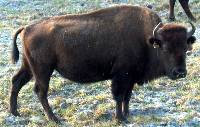Boy finds 5,000-year-old bison skull Now called 'Bradford Bison'
By Mike Miller
December 10, 2005
 A Prairie du Sac youngster, exploring the Wisconsin River bottom because he couldn't play high-tech games, made the archeological find of the year in Wisconsin when he unearthed an ancient bison head and horns.
A Prairie du Sac youngster, exploring the Wisconsin River bottom because he couldn't play high-tech games, made the archeological find of the year in Wisconsin when he unearthed an ancient bison head and horns."It is one of the best finds of the year, if not the best," state archeologist John Broihahn said of the find, which he determined was the head and horns of a Bison Occidentalis, at least 5,000 years old.
And it is now officially known as the "Bradford Bison," in honor of Joshua Bradford, 7, who made the initial discovery. Josh was on an outing with Bob Weiss, 63, a Prairie du Sac insurance man who was paired with Josh as part of the Kids Companion program, which is run by the Optimists in the Sauk Prairie school district area. The program is a local version of the better known Big Brothers Big Sisters program.
Bob and Josh were still new to the program when they went for what was to be an afternoon that included playing games at a Sauk City arcade on Nov. 9, as Bob tells the story. "They were closed," Bob recalled Friday. So the pair was driving down Water Street when Bob took a look at the Wisconsin River.
"It was as low as I'd ever seen it," Bob said, "I've never seen such a large area of exposed sand."
So the pair went exploring. Josh was picking up clam shells and other oddities, and Bob, who likes to fish, was finding lots of fishing lures. Josh was running a good 20 to 30 feet ahead of Bob, "so he could be the first to find things," says Bob.
Josh suddenly yelled, "Bob, what's that?" Weiss recalled. "I said, 'It looks like driftwood to me.'"
"No, it's horns," Josh replied.
The low water had left about three-fourths of the head exposed, said Bob, and with a little digging and tugging, the two were able to free the large horns and part of a skull. Bob at first thought it was an ox. An exciting find, but not an especially rare one. Bob hauled the find back to his car, which was a half mile away. "Holy cow, was it heavy," Bob said. "It was water-logged and must have weighed 50 pounds, but I made it."
Bob then made what was a very good decision. About a week after the discovery he took what would turn out to be a bison head to Verlyn Mueller, the archivist at the Prairie du Sac Historical Society. Mueller suggested they call the State Historical Society and that's when Broihahn, whose post is within the society, got into the act.
After taking measurements, he and fellow archeologist Steve Kuehn decided, based on the shape and orientation of the horn cores and the overall size, that they had a Bison Occidentalis.
Although they have not precisely dated the beast, Broihahn said the species, a forerunner to the more modern American bison, has been extinct for the last 5,000 years.
Broihahn and Kuehn were in Prairie du Sac Friday to conduct their examination and Josh even got to take time off of school to watch them.
"He is a quiet little guy but he seemed interested in what we were doing and even helped us take some measurements," Broihahn said of Josh.
"He was excited, and we are excited too," added Broihahn. "This is a very significant find for several reasons. It's a Bison Occidentalis and we don't have many of those in Wisconsin."
The Prairie du Sac find is the eastern-most find of the species in Wisconsin, and only about three others have been found, mostly in the northwest portion of the state, Broihahn said.
"It helps us complete the story of what Wisconsin was like," in ancient times, he said. Broihahn plans further excavation at the site were young Josh made his discovery, and hopes to recover additional items. But he is at the mercy of the river.
"The water levels could present a challenge for us on this," he said. "If the river rises it will obviously be difficult to do anything then."
But the find also points out the importance of individuals who make such discoveries to bring them to the attention of the archeologists.
"We couldn't do our job as effectively if people didn't bring these things to us," Broihahn said.
From The Capital Times; Madison, WI.





No comments:
Post a Comment